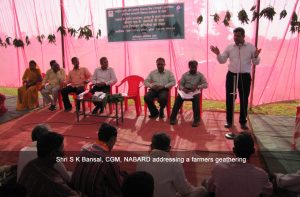Objectives



Objectives
Generation of Self-Employment in rural areas: Providing employment is not only the responsibility of the government, but also a social duty. In rural areas, finding a job is not easy — which is why self-employment becomes a powerful alternative. NCT has adopted the motto “Development through Self-Employment”, aiming to improve the income-generating capacity of its target groups. These groups mainly include small and marginal farmers, agricultural laborers, and poor rural artisans.
Women Empowerment:
Rural women form one of the most vulnerable sections of society. Their limited access to education often holds back their development. NCT believes that empowering women through economic development is key to helping them realize their full potential. By becoming financially independent, women can earn a living, support their families, and live with dignity.
NCT also focuses on building and strengthening partnerships with civil society — especially women’s organizations — to improve access to healthcare, education at all levels, and career or vocational guidance. The Trust strongly believes that self-employment is one of the most effective ways for women to achieve financial independence. Empowering women also creates broader positive impacts, such as improved child development, better education outcomes, and lower infant mortality rates.
Tribal Development:
Tribal communities are often considered one of the weaker sections of Indian society, largely due to their economic and social disadvantages when compared to other groups. Living in remote, hilly, and forested regions, they face challenges such as poor communication infrastructure, lack of clean drinking water, widespread illiteracy, and limited access to medical facilities.
To address these issues, NCT has begun focused efforts toward tribal development. The Trust aims to promote sustainable development using a participatory approach, helping tribal communities improve productivity in agriculture, animal husbandry, forestry, and cottage or small-scale industries. These initiatives are designed to raise income levels and improve the overall standard of living in tribal areas.
Natural Resource Management and environment:
Environmental conservation and ecological balance have become urgent global concerns. Issues like widespread pollution, soil erosion, declining groundwater levels, and the loss of biodiversity need immediate attention. NCT aims to contribute to environmental protection through sustainable natural resource management.
To achieve this, NCT works in areas such as watershed development, tree plantation, honey processing, biofuel development, and the utilization of fly ash generated by thermal power plants. These efforts not only support environmental health but also create livelihood opportunities for rural communities.
Rural Development and welfare of farmers:
NCT firmly believes that rural development is key to securing a better future for India. Inspired by Mahatma Gandhi’s vision, the Trust recognizes that the nation’s progress depends on the prosperity of its villages — especially its rural women and farming communities.
Since agriculture is the backbone of India’s economy, NCT works to empower farmers by offering training in modern farming techniques, promoting organic farming, and encouraging alternative income sources. The Trust also facilitates the formation of farmers’ Self-Help Groups (SHGs) and their federations, helping to build unity and mutual support during agricultural crises.
Health and sanitation:
Despite ongoing efforts by both government and non-government organizations, sanitation in India remains inadequate, particularly in rural areas. A large portion of the rural population still lacks access to proper sanitation facilities. NCT believes that improved sanitation is essential for better health, and therefore prioritizes the development of basic health infrastructure through rural sanitation.
Open defecation remains a serious concern, and NCT is committed to supporting rural families in constructing toilets and adopting safe sanitation practices. Beyond sanitation, NCT also engages in broader health initiatives such as AIDS awareness camps, family planning programs, maternal and child healthcare, malnutrition eradication, pulse polio drives, de-addiction programs, and blood donation camps.
Rural Habitat:
Shelter is one of the most basic human needs. With over 70% of India’s population living in rural areas, many still lack access to safe and comfortable housing. NCT aims to support the rural poor by helping them access the necessary resources to construct affordable-cost, durable homes that improve their living conditions and overall well-being.
